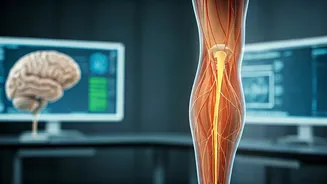The Leg-Brain Link
The often-overlooked connection between leg health and cognitive function is a significant one. Research indicates that the condition of your legs can provide
an early warning about your brain health. Neurologists have observed a correlation: diminished leg strength might be a predictor of cognitive decline. This connection isn't widely known, but understanding it is important for proactive health measures. It challenges the assumption that cognitive issues originate solely within the brain, offering a broader perspective on maintaining mental acuity. Recognizing this link encourages a more comprehensive approach to health, integrating physical exercises to support cognitive function.
Early Warning Signs
Identifying subtle indicators can aid early intervention. Some signs related to leg health might hint at impending cognitive issues. Changes in gait or walking patterns are key. If you find yourself shuffling, experiencing instability, or struggling to maintain balance, it may be a cause for concern. Additionally, changes in leg muscle mass or strength, like difficulty getting up from a chair or climbing stairs, should be noted. These physical changes, though seemingly unrelated to brain health, can be early indicators. Regular self-assessment and paying close attention to these physical abilities are useful for recognizing potential issues. Consulting with healthcare professionals for these changes is crucial to get a comprehensive understanding and proactive guidance.
Why This Matters
The link between leg health and cognitive decline is crucial for several reasons. Firstly, early detection allows for timely interventions, slowing the progression of cognitive issues. Secondly, it emphasizes the significance of lifestyle choices. This link encourages people to prioritize physical activity for both body and mind. It's a call to action for everyone to consider how physical health affects cognitive capabilities. This connection broadens the concept of brain health, suggesting that it's not isolated. Maintaining mobility and strength are not merely physical goals; they are an investment in cognitive well-being. This perspective redefines how we consider health and wellness.
Preventive Strategies
Several steps can be taken to safeguard cognitive function via leg health. Exercise is the primary preventive measure. Activities like brisk walking, jogging, or resistance training are beneficial. These actions improve leg strength and enhance blood flow, crucial for brain health. A balanced diet contributes as well. Nutrients support both muscle and brain function. Including plenty of fruits, vegetables, and lean proteins helps maintain overall health. Consider engaging in cognitive activities. Activities like puzzles and reading can keep the mind sharp. By incorporating these strategies, individuals can proactively protect cognitive health. Regular physical activity, a nutritious diet, and mental stimulation will have a positive impact on both physical and cognitive well-being.
Seeking Professional Help
Consulting healthcare professionals is crucial. If you observe any of the early warning signs mentioned earlier, seek medical advice. Discussing these changes allows for comprehensive assessments, including cognitive and physical evaluations. These assessments help determine the cause of symptoms and give personalized advice. A doctor may recommend a physical therapist. A physical therapist creates customized exercise programs. These programs enhance strength and balance, thus contributing to improved cognitive function. Regular check-ups and open communication with your healthcare team are useful for proactive healthcare and monitoring of overall health. Early intervention is often key, making medical consultation a proactive step in protecting cognitive health.



















